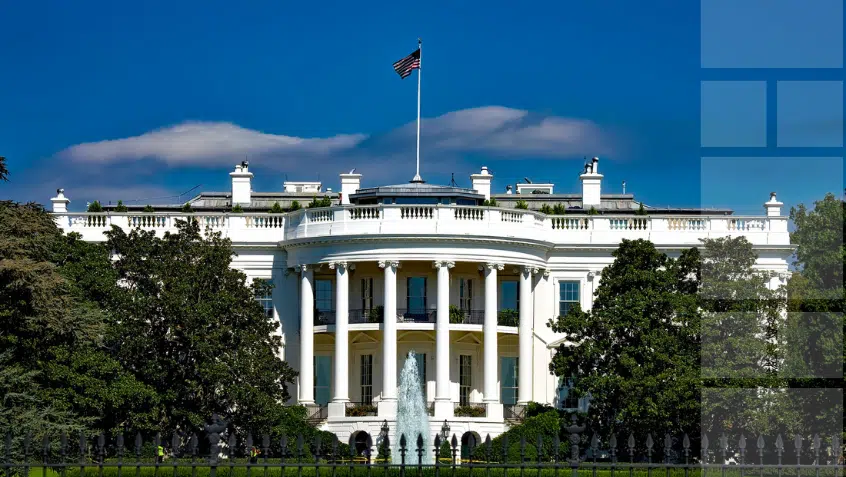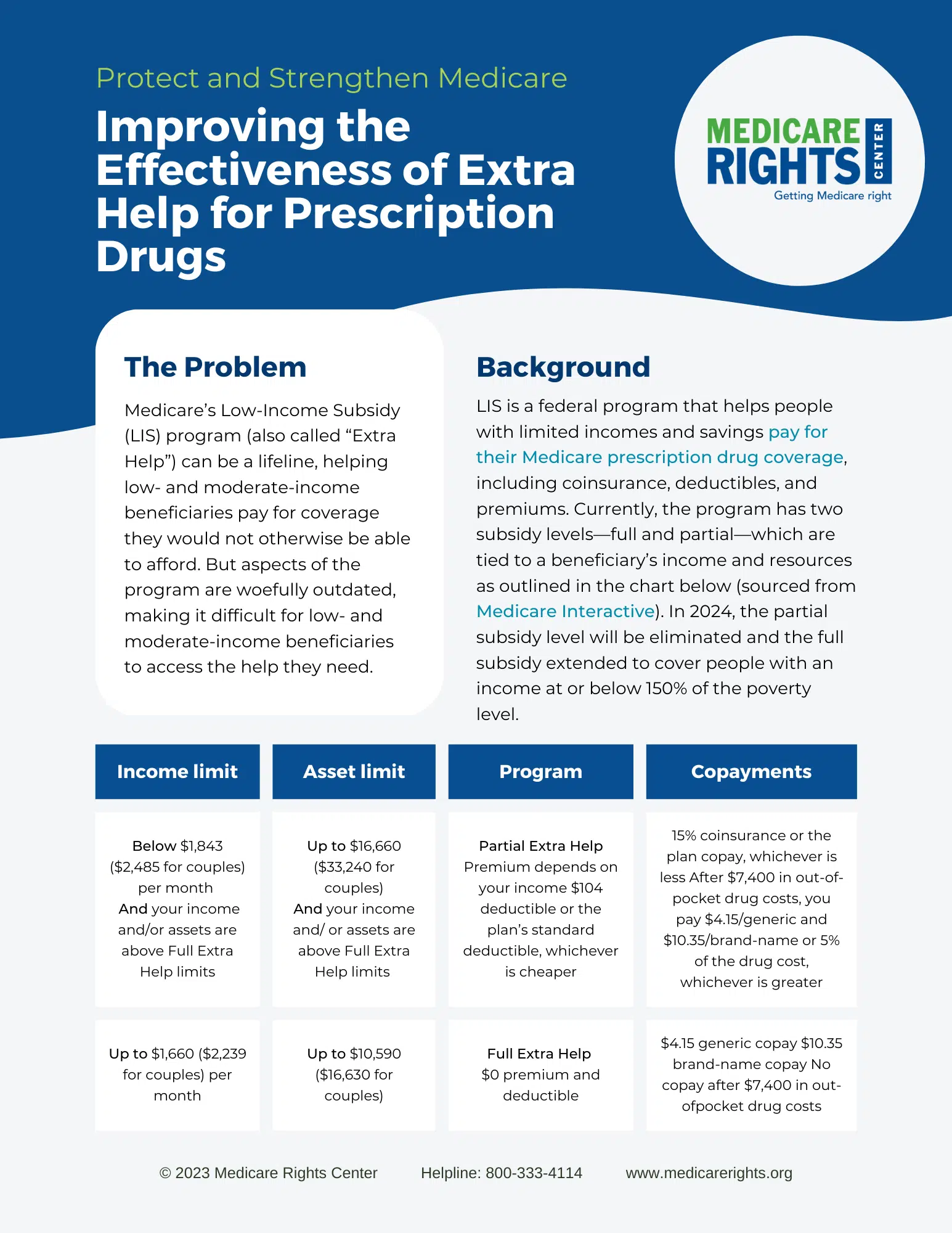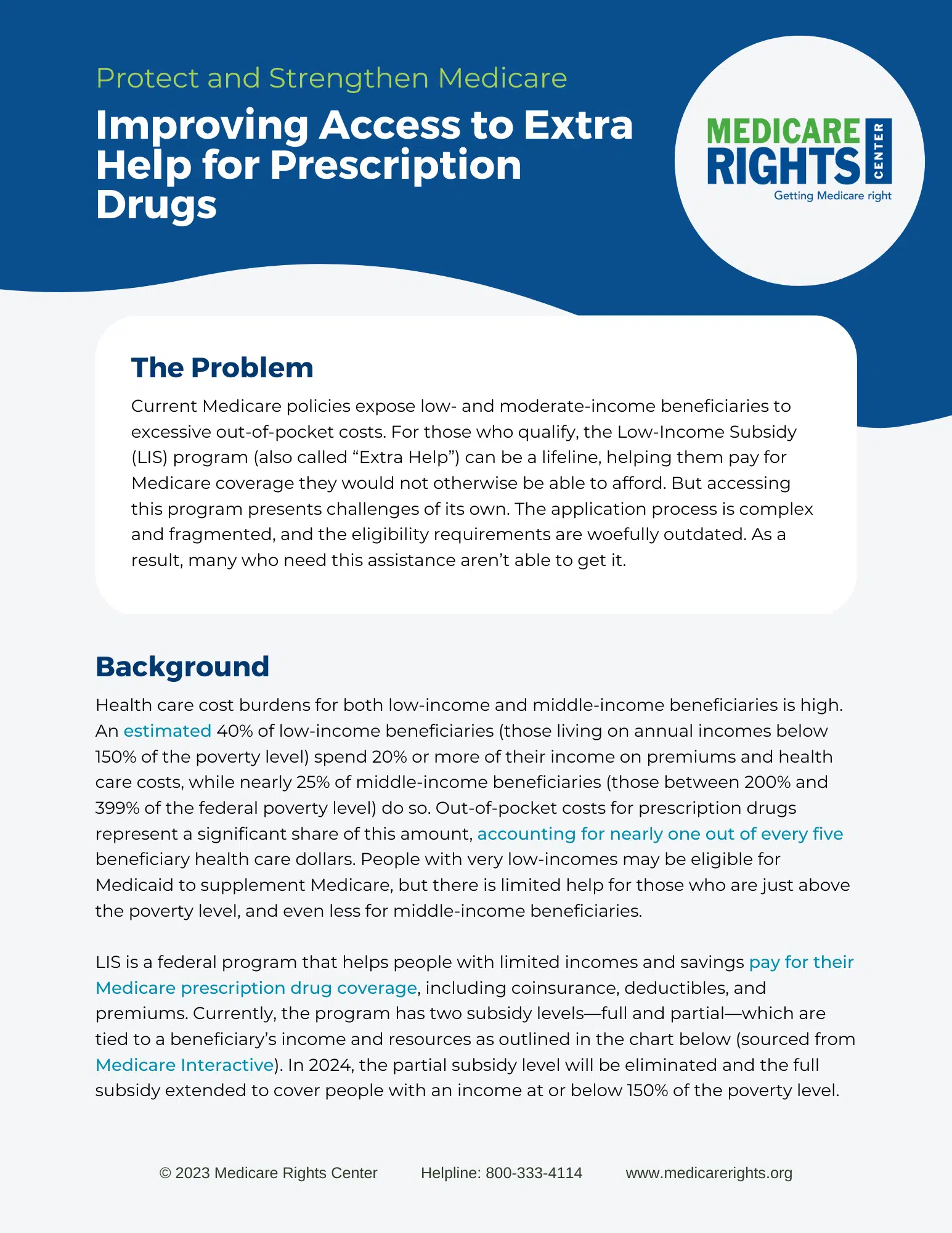
Merck Sues in Longshot Bid to Derail Medicare Drug Price Negotiation
This week, the pharmaceutical giant Merck sued the U.S. Department of Health and Human Services (HHS), challenging Medicare’s authority to
Join Us Live for a Discussion on Medicare, Democracy, and the Future of Health Care
The Inflation Reduction Act (IRA) takes important steps to reduce drug prices and lower costs for people with Medicare and the program, such as capping beneficiary out-of-pocket spending; requiring Medicare to negotiate drug prices; and expanding eligibility for the full Part D low-income subsidy (LIS). We support an implementation process that centers the beneficiary experience and look forward to building upon these landmark policies.

This week, the pharmaceutical giant Merck sued the U.S. Department of Health and Human Services (HHS), challenging Medicare’s authority to

A recently released study found that in 2022, over 20% of adults 65 and older experienced cost-related medication nonadherence, meaning

This week, the Centers for Medicare & Medicaid Services (CMS) finalized proposed policy changes to Medicare Advantage (MA) and Part
Callers to our national helpline regularly report struggling to afford the prescription medications they need to maintain their health and well-being. The Inflation Reduction Act’s (IRA) Medicare Drug Price Negotiation Program could offer much-needed relief. In our comments, we offer recommendations to implement this program in a way that enhances affordability, ensures accuracy, and maximizes transparency.

Implementation of the drug pricing provisions of the Inflation Reduction Act (IRA) is underway. This week, Medicare Rights submitted comments
The Inflation Reduction Act’s (IRA) Rebate Program will require drug companies to pay a rebate if they raise certain Part D drug prices faster than inflation, reining in the industry practice of sky-high annual price adjustments. This deterrent will strengthen beneficiary and program finances.
The Inflation Reduction Act’s (IRA) Rebate Program will require drug companies to pay a rebate if they raise certain Part B drug prices faster than inflation, reining in the industry practice of sky-high annual price adjustments. This deterrent will strengthen beneficiary and program finances.

Today, the White House released President Biden’s budget request for fiscal year (FY) 2024, which begins on October 1. Though

Medicare’s Low-Income Subsidy (LIS) program (also called “Extra Help”) can be a lifeline, helping low- and moderate-income beneficiaries pay for coverage they would not otherwise be able to afford. But aspects of the program are woefully outdated, making it difficult for low- and moderate-income beneficiaries to access the help they need.

Current Medicare policies expose low- and moderate-income beneficiaries to excessive out-of-pocket costs. For those who qualify, the Low-Income Subsidy(LIS) program (also called “Extra Help”) can be a lifeline, helping them pay for Medicare coverage they would not otherwise be able to afford. But accessing this program presents challenges of its own. The application process is complex and fragmented, and the eligibility requirements are woefully outdated. As a result, many who need this assistance aren’t able to get it.

This week, the pharmaceutical giant Merck sued the U.S. Department of Health and Human Services (HHS), challenging Medicare’s authority to

A recently released study found that in 2022, over 20% of adults 65 and older experienced cost-related medication nonadherence, meaning

This week, the Centers for Medicare & Medicaid Services (CMS) finalized proposed policy changes to Medicare Advantage (MA) and Part
Callers to our national helpline regularly report struggling to afford the prescription medications they need to maintain their health and well-being. The Inflation Reduction Act’s (IRA) Medicare Drug Price Negotiation Program could offer much-needed relief. In our comments, we offer recommendations to implement this program in a way that enhances affordability, ensures accuracy, and maximizes transparency.

Implementation of the drug pricing provisions of the Inflation Reduction Act (IRA) is underway. This week, Medicare Rights submitted comments
The Inflation Reduction Act’s (IRA) Rebate Program will require drug companies to pay a rebate if they raise certain Part D drug prices faster than inflation, reining in the industry practice of sky-high annual price adjustments. This deterrent will strengthen beneficiary and program finances.
The Inflation Reduction Act’s (IRA) Rebate Program will require drug companies to pay a rebate if they raise certain Part B drug prices faster than inflation, reining in the industry practice of sky-high annual price adjustments. This deterrent will strengthen beneficiary and program finances.

Today, the White House released President Biden’s budget request for fiscal year (FY) 2024, which begins on October 1. Though

Medicare’s Low-Income Subsidy (LIS) program (also called “Extra Help”) can be a lifeline, helping low- and moderate-income beneficiaries pay for coverage they would not otherwise be able to afford. But aspects of the program are woefully outdated, making it difficult for low- and moderate-income beneficiaries to access the help they need.

Current Medicare policies expose low- and moderate-income beneficiaries to excessive out-of-pocket costs. For those who qualify, the Low-Income Subsidy(LIS) program (also called “Extra Help”) can be a lifeline, helping them pay for Medicare coverage they would not otherwise be able to afford. But accessing this program presents challenges of its own. The application process is complex and fragmented, and the eligibility requirements are woefully outdated. As a result, many who need this assistance aren’t able to get it.